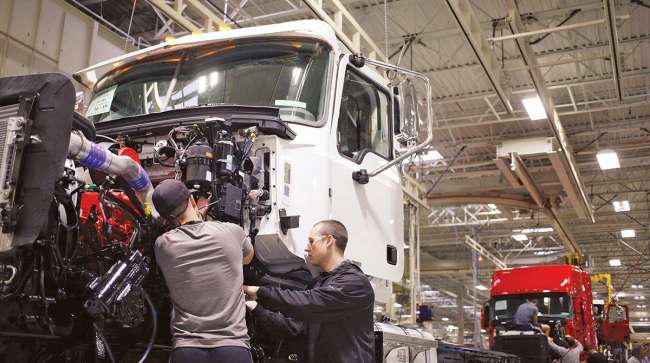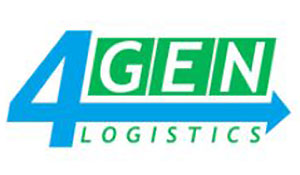Senior Reporter
March Class 8 Orders at 21,000 Stay in Familiar Zone

[Stay on top of transportation news: Get TTNews in your inbox
North American Class 8 orders in March were just over 21,000 to keep pace with levels reached over the past few months amid mounting concerns over broader economic conditions, ACT Research reported, citing data truck makers will finalize later in the month.
Class 8 orders hit 21,300, according to ACT. That compared with 40,049 a year earlier.
“We are now talking [production and order] allocations into 2023,” ACT Vice President Steve Tam said. “The truck makers’ crystal balls are not any less opaque than anybody else’s. They are looking at the problems of getting materials, the higher prices associated with those materials, paying more for labor, having a harder time finding drivers to deliver trucks.”
ACT Research: March’s Preliminary CV New Order Activity Trending in Narrow Rangehttps://t.co/Z4bdh8QYQw — ACT Research (@actresearch) April 4, 2022
FTR pegged preliminary orders at 21,500.
“This trend began seven months ago and has not varied much,” said Don Ake, vice president of commercial vehicles for FTR. “Conditions remain stagnant. We still have to watch for those computer chips.”
This trend began seven months ago and has not varied much.
Don Ake, vice president of commercial vehicles for FTR
At the same time, various industry analysts have begun to voice concerns over a potential downturn in the fortunes of the freight market — citing falling spot truckload rates, potentially weaker contractual pricing, soaring diesel prices, highly leveraged smaller operators, a shift by consumers to spending on services, and rising inflation and interest rates.
“Risks and uncertainty have risen recently,” Bob Costello, American Trucking Associations’ chief economist, told Transport Topics. “But as of today, I see slower growth, perhaps slightly lower volumes in some sectors or lanes, but not a collapse in the industry this year.

Volkmann
“I will say that it is difficult to draw too many conclusions on very recent data as normal seasonal patterns are still off from the pandemic.”
Stephen Volkmann, a research analyst at Jefferies, wrote in a note, “With a majority of truckload freight either directly or indirectly driven by consumer activity, we have some concerns that the combination of higher interest rates and inflation could slow the economy and temper freight demand over the next few quarters.”
Meanwhile, orders are slowly mounting for alternative-power trucks.
Startup WattEV ordered 50 Class 8 Volvo VNR Electric trucks to launch its truck-as-a-service model in California, Volvo Trucks North America reported.
WattEV intends its TaaS model to provide shippers and carriers access to battery-electric trucks at a per-mile rate, including charging (and potentially maintenance) that is on par with the total cost of operating diesel trucks.

Youssefzadeh
WattEV’s stated goal is to put 12,000 electric heavy-duty trucks on the road with a supporting infrastructure by 2030.
Its first public truck charging depots will be in Bakersfield, San Bernardino and near the Port of Long Beach, and will feature 250 kilowatt CCS (combined charging system) chargers that will provide the Volvo VNR Electric trucks an 80% charge in 90 minutes for the six-battery packs.
“The way we try to bring down the cost compared with trucks running diesel is to operate the electric trucks more. It really becomes an optimization problem, how we manage our assets and how efficiently we use those assets to get more miles driven on them per day,” WattEV CEO Salim Youssefzadeh told TT.
The Volvo VNR Electric has a range of 275 miles, and WattEV expects to receive the first of the vehicles by the end of the year.
The company has five charging sites under contract and with others in the pipeline, envisions a zero-emission corridor going from Long Beach up to Northern California.

Kenworth Truck Co., a brand of Paccar Inc., announced Rialto, Calif.-based 4 Gen Logistics placed an order for 20 Kenworth T680Es.
The Kenworth T680E is designed for pickup and delivery, regional haul and drayage applications. It has an 82,000-pound gross vehicle weight rating and an estimated 150-mile operating range, depending on the application.
Hyliion Holdings Corp. announced Laredo, Texas-based Mone Transport ordered 20 units backed by deposits to secure production slots for Hyliion’s Hypertruck ERX — an electric powertrain that is recharged by an onboard natural gas generator. The powertrain, intended for heavy-duty trucks, has a range of about 900 miles.
Want more news? Listen to today's daily briefing above or go here for more info
In related news, the U.S. Securities and Exchange Commission ruled March 31 shareholder advocacy nonprofit As You Sow’s shareholder proposal to Travelers and Chubb Ltd. insurance companies can move to a vote at the company’s annual general meeting.
As You Sow’s proposals ask the companies to report whether and how each intends to measure, disclose and reduce greenhouse gas emissions associated with their underwriting, insuring and investment activities, in alignment with the Paris Agreement’s 1.5ºC goal requiring net-zero emissions.
The U.S. insurance industry invested $582 billion in fossil fuel-related activities in 2019, an increase compared with $519 billion in 2018, according to the nonprofit.





